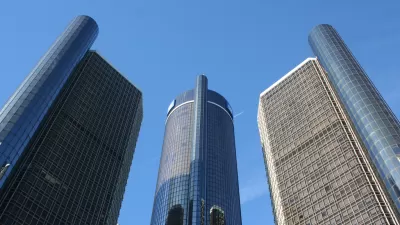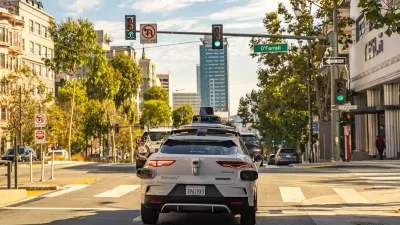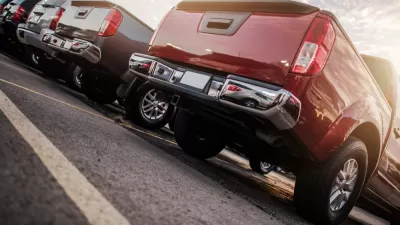General Motors cut the bad environmental and economic news with an announcement that cost cutting measures would allow the company to focus more resources on electric and self-driving cars.

[Updated Nov. 27, 2018]
Nathan Bomey reports for the USA Today:
General Motors is killing several passenger cars, including the Chevrolet Volt and Chevrolet Cruze, two compact vehicles that were held up as examples of the automaker's post-bankruptcy revival.
The move — part of a sweeping cost-cutting plan unveiled Monday — comes as Americans are abandoning passenger cars in favor of crossovers, SUVs and pickups.
The company hopes to cut $6 billion in costs in all, according to Bomey.
While this article focuses more on the business and consumer interest in the news, other stories took a different angle toward the story, including another article by Bomey on the five plants that would be closed in the United States and Canada.
"The Detroit-based automaker said it would end production by the end of 2019 at its Lordstown Assembly plant in northeast Ohio, its Detroit-Hamtramck Assembly plant in southeast Michigan, its Oshawa Assembly plant in Ontario, its Baltimore Operations parts plant in Maryland and its Warren Transmission Operations plant in southeast Michigan," according to Bomey. This part of the story prompted an angry response from President Trump.
John Gallagher followed up on news of the plant closures with an article about the controversial history of the Detroit-Hamtramck Assembly plant, which displaced the historic neighborhood of Poletown when it was constructed.
It's fair to say that Poletown-type seizures had already lost in the court of public opinion. Critics had long claimed that GM's Hamtramck plant never delivered the jobs and economic spin-offs that justified the razing of the Poletown neighborhood. Such complaints were one factor in voters' approval of even tighter restrictions on eminent domain in a 2006 ballot referendum called Proposal 4.
Finally, the media also focused on the environmental consequences of the company's downscaling. Aditi Shrikant writes for Vox and sets a pretty drastic pivot from the points discussed above:
GM’s shuttering of plants is also a step toward its new focus on producing electric and autonomous vehicles; its new motto is “Zero Crashes, Zero Emissions, Zero Congestion.” In 2017, the company bought Cruise Automation, a San Francisco-based driverless car company. According to a press release, “resources allocated to electric and autonomous vehicle programs will double in the next two years.”
Shrikant's coverage provides more details of the political fallout of the decision, collecting the Twitter responses of local, state, and federal political representatives in area's impacted by plant closures.
Finally, Henry Grabar is the first to write skeptically in response to the notion that GM's changes have the best public outcomes in mind. Instead of a sober approach to operation, or a new commitment to efficient vehicles, the decision is mostly, "a response to Americans’ burgeoning love for pick-ups and SUVs," according to Grabar.
Giving Americans what they want has consequences, like worsening pedestrian safety outcomes and stalled fuel efficiency progress.
Update: A few more stories of interest to consider all sides of the GM news:
- Chevy Volt was going to save Detroit. Now its workers are losing jobs (USA Today via Detroit Free Press, Nov. 27, 2018))
- An older article that predicted problems for GM last year: Auto slowdown flashes caution lights for manufacturing employment — and Trump (Brookings, June 19, 2017)
FULL STORY: GM to kill Chevrolet Volt, Cruze, Impala as Americans ditch passenger cars

Alabama: Trump Terminates Settlements for Black Communities Harmed By Raw Sewage
Trump deemed the landmark civil rights agreement “illegal DEI and environmental justice policy.”

Planetizen Federal Action Tracker
A weekly monitor of how Trump’s orders and actions are impacting planners and planning in America.

Why Should We Subsidize Public Transportation?
Many public transit agencies face financial stress due to rising costs, declining fare revenue, and declining subsidies. Transit advocates must provide a strong business case for increasing public transit funding.

Understanding Road Diets
An explainer from Momentum highlights the advantages of reducing vehicle lanes in favor of more bike, transit, and pedestrian infrastructure.

New California Law Regulates Warehouse Pollution
A new law tightens building and emissions regulations for large distribution warehouses to mitigate air pollution and traffic in surrounding communities.

Phoenix Announces Opening Date for Light Rail Extension
The South Central extension will connect South Phoenix to downtown and other major hubs starting on June 7.
Urban Design for Planners 1: Software Tools
This six-course series explores essential urban design concepts using open source software and equips planners with the tools they need to participate fully in the urban design process.
Planning for Universal Design
Learn the tools for implementing Universal Design in planning regulations.
Caltrans
Smith Gee Studio
Institute for Housing and Urban Development Studies (IHS)
City of Grandview
Harvard GSD Executive Education
Toledo-Lucas County Plan Commissions
Salt Lake City
NYU Wagner Graduate School of Public Service





























